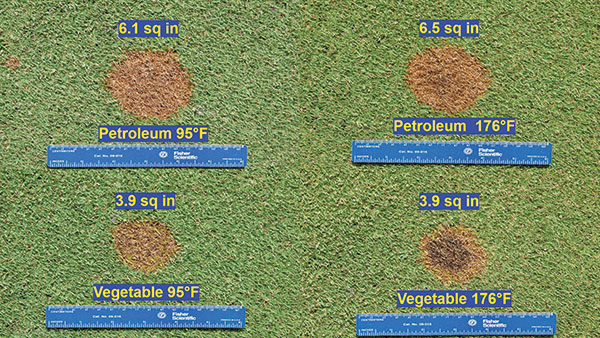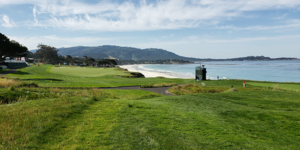Does temperature influence hydraulic oil injury?
Hydraulic equipment is vital to turfgrass management. Hydraulic oil leaks occur because of equipment malfunction and/or human error. The leaks injure putting green turf and cause loss of turf quality because the oil kills turfgrass shoots.
Most hydraulic oil leaks occur during the operation of equipment, and it’s been assumed by many people that the heat of the fluid leaking from equipment kills the turf. There are numerous references to this in the literature. If the heat associated with the hydraulic oil causes turfgrass injury, then spills of hydraulic oils at ambient outdoor temperature should result in less turfgrass injury.

Figure 1. Injury to TifEagle bermudagrass following a simulated hydraulic oil leak.
To test this hypothesis, research was conducted in North Fort Myers, Fla. in September 2014 to determine the effect of temperature on hydraulic oil injury. Two hydraulic oils, petroleum hydraulic oil and vegetable hydraulic oil, were applied to a TifEagle hybrid bermudagrass (Cynodon dactylon x C. tranvaalensis) green at two temperatures, 95 degrees F and 176 degrees F. The 95 degrees F was ambient outdoor temperature, and 176 degrees F was the estimated temperature of hydraulic oil in running equipment. Three milliliters of each oil at each temperature were applied to turf, and the injury area was evaluated daily for seven days using digital image analysis. There were four replications of each treatment in a two-factor, completely randomized experimental design, and the experiment was repeated.
Temperature did not influence injury area, but hydraulic oil type did (Figure 1). Spills of petroleum hydraulic oil consistently resulted in a larger injury area compared with vegetable hydraulic oil, but both oils killed turf. However, there were no significant differences in injury area between temperatures for either oil type. Hot oil will kill turf. But the notion that it is the heat that kills the turf is a myth. Hydraulic oil at ambient outdoor temperature kills turf just as dead.
Photo: Lee Berndt, Ph.D.
William L. Berndt, Ph.D. is president of Environmental Turf, Inc., Fort Myers, Fla. Lee can be reached at leeberndt@aol.com for more information.









